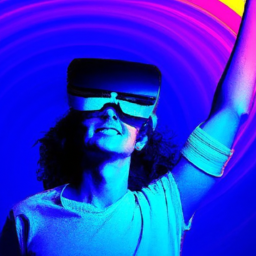The Future of Virtual Reality in Digital Marketing
Virtual Reality (VR) is no longer just a concept found in science fiction movies. It has become a reality and is now being used in various industries, including digital marketing. VR is a technology that immerses users in a simulated environment and provides a unique and interactive experience. In this blog post, we will discuss the potential impact and benefits of VR in digital marketing.
Creating an Immersive Customer Experience
One of the key benefits of VR in digital marketing is its ability to create an immersive customer experience. With VR, businesses can transport their customers to a virtual world where they can interact with products or services in a way that is not possible with traditional marketing techniques. For example, a travel agency can use VR to allow potential customers to virtually explore various destinations, giving them a taste of what it would be like to visit those places. This immersive experience can significantly enhance customer engagement and drive conversions.
Boosting Brand Awareness and Visibility
VR has the potential to boost brand awareness and visibility by providing a unique and memorable experience to customers. When a brand offers a VR experience, it stands out from the competition and leaves a lasting impression on customers. This can lead to increased word-of-mouth marketing and social media sharing, helping to spread the brand’s message further and reach a wider audience.
Enhancing Product Demonstrations
Product demonstrations are an integral part of marketing campaigns, as they allow customers to see and experience the features and benefits of a product. VR can take product demonstrations to the next level by providing a fully immersive and interactive experience. For example, a furniture retailer can use VR to allow customers to virtually place furniture in their own homes, giving them a better understanding of how it would look and fit in their space. This can eliminate uncertainty and increase the likelihood of a purchase.
Personalizing Marketing Campaigns
VR can also contribute to personalized marketing campaigns. By collecting and analyzing user data, businesses can provide tailored VR experiences to their customers. For example, an online clothing retailer can create personalized virtual shopping experiences based on a customer’s preferences and body measurements. This personalized approach can enhance customer satisfaction and loyalty.
Expanding Reach and Engagement
VR has the potential to expand a brand’s reach and engagement by allowing it to connect with customers beyond geographical limitations. With VR, businesses can host virtual events, conferences, or product launches, reaching a global audience without the need for physical attendance. This not only saves on costs but also increases accessibility and convenience for customers.
The Challenges and Considerations
While VR offers exciting opportunities for digital marketing, there are a few challenges and considerations to keep in mind. First, VR technology is still relatively new and may require significant investment in hardware and software. Additionally, not all customers may have access to VR devices, limiting the potential audience. However, as technology advances and becomes more affordable, these challenges are likely to diminish.
In conclusion, Virtual Reality has the potential to revolutionize digital marketing by creating immersive customer experiences, boosting brand awareness, enhancing product demonstrations, personalizing marketing campaigns, and expanding reach and engagement. As businesses continue to embrace this technology, we can expect to see a shift in the way marketers connect with their customers in the future.











